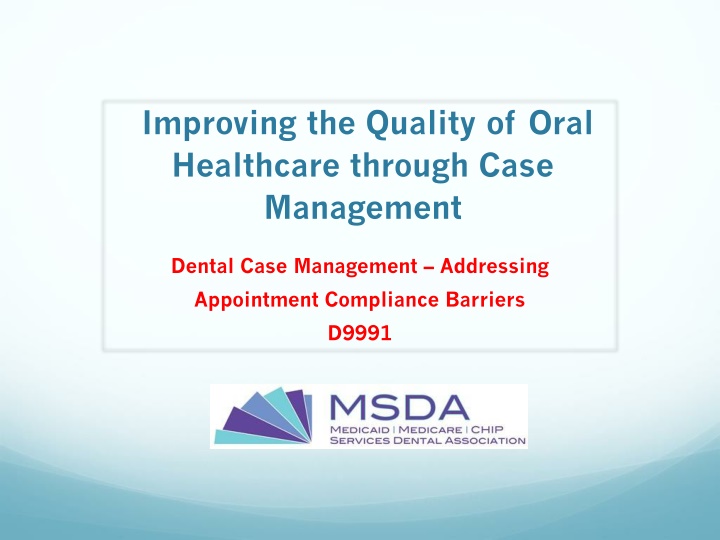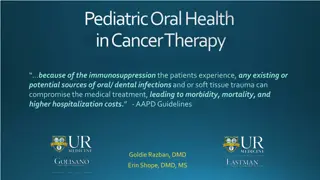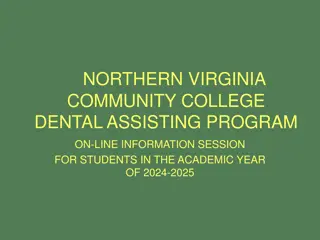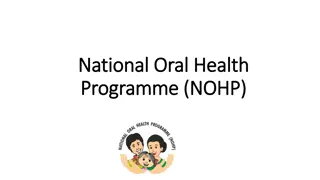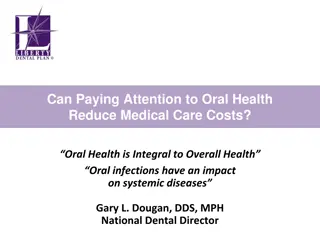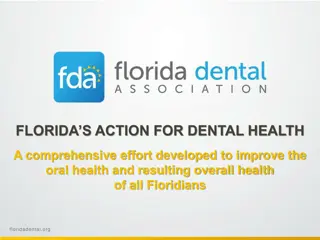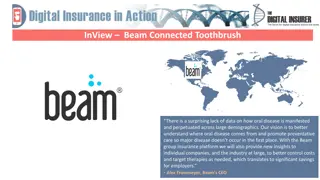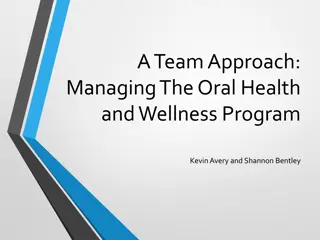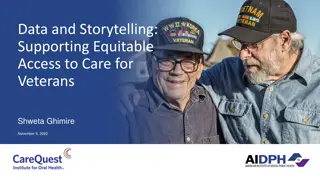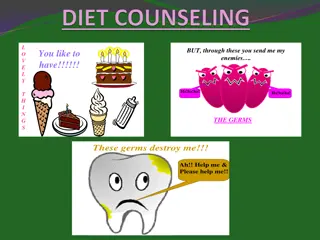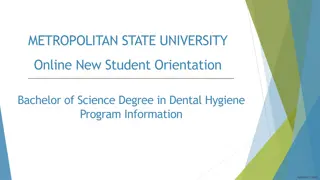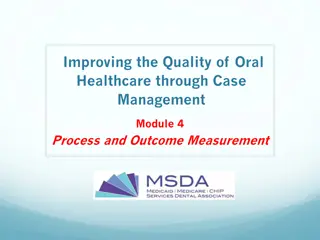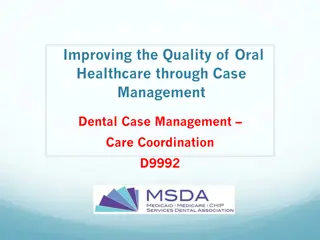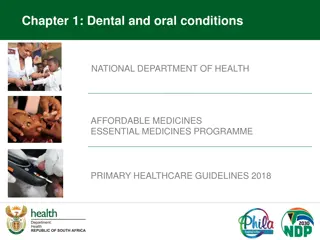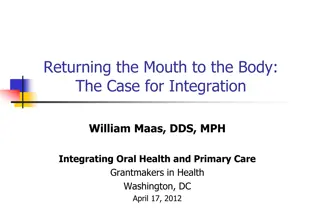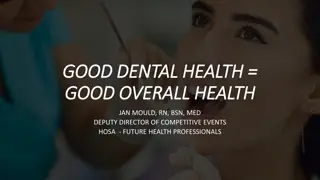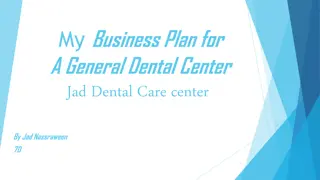Enhancing Oral Healthcare through Dental Case Management Program
This professional education program aims to improve the quality of oral healthcare by providing dental workforce with training modules addressing appointment compliance barriers. Participants learn to identify opportunities in case management services, understand patient needs assessment, document care improvements, and engage state agencies for reducing transportation barriers. With support from various organizations, the program emphasizes the importance of dental office case management in enhancing patient experience and treatment outcomes. Implementation includes testing new billing codes to streamline services and track outcomes before full launch. Dental providers are required to meet specific qualifications to participate in the program.
Download Presentation

Please find below an Image/Link to download the presentation.
The content on the website is provided AS IS for your information and personal use only. It may not be sold, licensed, or shared on other websites without obtaining consent from the author.If you encounter any issues during the download, it is possible that the publisher has removed the file from their server.
You are allowed to download the files provided on this website for personal or commercial use, subject to the condition that they are used lawfully. All files are the property of their respective owners.
The content on the website is provided AS IS for your information and personal use only. It may not be sold, licensed, or shared on other websites without obtaining consent from the author.
E N D
Presentation Transcript
Improving the Quality of Oral Healthcare through Case Management Dental Case Management Addressing Appointment Compliance Barriers D9991
Acknowledgements Improving the Quality of Oral Healthcare through Case Management is a professional education and training program designed to advance the knowledge, skill, and competency of the dental workforce. The curricula is made up of training modules which have been made available through the generous support of the following organizations and agencies: Rhode Island Department of Health Rhode Island Executive Office of Health and Human Services Rhode Island Dental Association Medicaid|Medicare|CHIP Services Dental Association Health Resources and Services Administration
Module 7 Learning Objectives Participants will: Recognize new opportunities for dentistry in delivering case management services by identifying their most appropriate use; Understand key components of addressing appointment compliance barriers (like conducting a needs assessment) and how they affect the patient experience; Identify the benefits of dental office case management as it relates to addressing appointment compliance barriers; Describe the role that state agencies and community supports play in reducing transportation barriers; Learn how to document case management services delivered in the dental office setting to help monitor care & improvements.
Improving the Quality of Oral Healthcare through Case Management Take the Module 7 Pre-Test Now https://www.surveymonkey.com/r/M7Pre
RI EOHHS Case Management Policy A Toolkit for Billing
Implementation of Dental Case Management Before launching more broadly, RI EOHHS will test the four new codes. Pilot Initiative - volunteer dental practices - services are billed, reimbursed and tracked - certain outcomes will be evaluated A decision for a full launch of codes will be made after sufficient data analysis
Dental Provider Qualifications 1. RI Medicaid-enrolled 2. Complete 5 online Case Management Learning Modules 3. Complete 5 Module Pre & Post-tests 4. Authorization from EOHHS
Who Provides the Services? Employing a dedicated dental case manager can be difficult financially, which is why the dental case management services can be provided by a trained dental team.
Tips for Conducting a Needs Assessment Some important principles that apply to all assessment areas are: Start with active listening and allow patients to express their needs and desires Build a relationship on mutual respect and focus on strengths All of the needs areas should be addressed and prioritized, as per the consumer s ability to participate. Ask open-ended questions. Involve family members and appropriate social resources
Assessing Needs Focus Areas Sample Questions &/or Solutions Dental Needs Assessment Will motivational interviewing be useful? Emergency care (urgent issues, severe pain) Is eating/nutrition impacted? (painful/difficult to eat?) Will patient need extensive care Assess Patient Health Needs Will motivational interviewing be useful? Chronic conditions (e.g. diabetes, heart disease) Medication use Mental Health status and treatment Clients' Cognitive/Functional Capacity Is care coordination appropriate? Assess Need for Social Support Literacy & oral health literacy levels (tool/s) Areas of patient education? Will motivational interviewing be useful? Pre-Referral & Client Contract Build rapport, trust, allay fears, provide patient education. Agree on expectations of dental treatment
Dental Treatment - Case Management Considerations Can take multiple visits for complex dental treatment plan Behavioral issues, intervention management (lots of unknowns when patient is in new environment) Management of covered vs. non- covered dental procedures Monitor co-occurring conditions (D/A, MH, chronic conditions) Patient Education, instructions, language, literacy Follow-up after extractions and intensive procedures (infection, pain management) Transportation assistance Advocacy/Education/Assurance: Does CM have to advocate on behalf of patient to dental provider? or educate and assure patient? Coordination of treatment between emergency provider, hospital, dental provider, and outside referrals Other life case management: Benefits, housing, substance use, medical, etc. http://www.achch.org/uploads/7/2/5/4/72547769/dental_poster_achchp_nhchc_5-2016final.pdf
Understanding Dental Case Management CDT Codes D9991 Dental Case Management Addressing Appointment Compliance Barriers Individualized efforts to assist a patient to maintain scheduled appointments by solving transportation challenges or other barriers.
Some Compliance Barriers & Potential Solutions Relapse (drugs/alcohol) or Mental Health - Empathetic, harm reduction relationship with patient; - integrated D/A treatment, mental health treatment Life Priorities: Employment, medical appointments, court, parole, other appts. - Assistance with life-organizing skills, transportation Strict residential programs, deny mobility to clients - Advocacy, relationship with programs Jail/Institutionalization - Ongoing relationship with patient, program Quick Dropout (e.g., starts treatment but quickly decides not to continue) - Dental Contract: - Careful explanation of steps and responsibilities; discussion of priorities Health and Mobility of patient - Strong enough to travel & be treated? - What dental approach is most suitable?
Solutions to Transportation Barrier Transportation Assistance (for non-Emergency healthcare visits is available through LogistiCare for Medicaid-covered individuals) Print area bus route maps and make travel plans with patient Assist patient in accessing disabled transit ID card when possible Collaborate with support staff at shelters, nursing homes, and other social service agencies, etc. Work with job advocates, local workforce centers, and various other employment organizations
RI Medicaid Transportation Program RI Medicaid has transportation information available to you as a dental professional. LogistiCareis the State s non-emergency transportation contractor. A two-day notification is required Call the Where s My Ride number line at: 855-330-9132 To learn more about RI Medicaid s Transportation Program, go to: http://www.eohhs.ri.gov/Consumer/TransportationServices.aspx for more information.
Rhode Islands Publicly-funded Transportation Services Effective May 1, 2014, the State of Rhode Island has a new vendor, LogistiCare, coordinating transportation services for Medicaid beneficiaries and individuals over the age of 60 who do not have access to transportation for critical appointments and services. Please see the phone numbers below. This transportation system is for Non-Emergency Medical Transportation only. This is for scheduling medical appointments for Medicaid beneficiaries and individuals over the age of 60, who do not have a means for transportation. Please note that Medicaid beneficiaries who can use public transportation or can access rides from family and friends should do that first.
RI Medicaid Transportation Program For more information on LogistiCare, FAQs, and upcoming webinars, please see the documents below. Please feel free to distribute and communicate this information to consumers, families, staff, etc. Go to: http://www.eohhs.ri.gov/Portals/0/Uploads/Docume nts/Transportation%20FAQs%20Medical%20practitio ner%20FAQs%2003-31-14.pdf
Typical Delivery of D9991 1. Patients receive a comprehensive assessment - identifies potential barriers to care 2. Services are developed based on assessment - patient s interest in receiving case management services. 3. The intent is for Case Management services like D9991 is to provide other dental services on the same day.
EXAMPLE- Case Study 1 Successfully coordinate transportation Issue: A new Medicaid-insured adult male has a follow-up restorative appointment scheduled in two weeks. Upon assessment, it becomes apparent that he will need transportation for the appointment. Solution:Staff coordinates directly with the State s current transportation contractor, LogistiCare to schedule the patient s next appointment then and confirms the scheduled transportation for/with the patient 24 hours prior to the appointment date. Billing: D9991 is billed to Medicaid along with the CM Pilot Data Collection Form and the appropriate notes are entered into the patient record.
EXAMPLE - Case Study 2 Schedule an elder s appointments with family Issue: Through recent patient assessments, it is evident that an elder woman patient is becoming forgetful. After several missed appointments, it becomes necessary to ask the patient s permission to contact her children for assistance. Solution:A discussion with the elder woman s son or daughter results in a decision to contact them to schedule all future appointments and to accompany their Mother to appointments, when possible. Billing: D9991 is billed to Medicaid along with the CM Pilot Data Collection Form and the appropriate notes are entered into the patient record.
EOHHS Policy-Code Use During Pilot May be billed for all non-RIte Smiles enrollees (older children & adults (ages 21+) Initial Assessment should be completed and filed - Dental Needs Assessments: part of medical history or supplemental D9991 code may be billed to EOHHS one time per date of service for the same patient Additional dental services (including other case management) may be billed on the same day
EOHHS Policy-FQHC Code Use During Pilot May be billed for all non-RIte Smiles enrollees (older children & adults (ages 21+) Initial Assessment should be completed and filed - Dental Needs Assessments: part of medical history or supplemental D9991 code may be billed to EOHHS one time per date of service for the same patient D9991 must be billed with at least one other covered dental service (besides the other 3 CM codes) on the same day in order to qualify as a dental encounter
EOHHS Guide for Billing During the Pilot RI Medicaid has authorized you to bill for CM services, so your practice s claims will be monitored and tracked as they are submitted Submit Medicaid dental claim using the same process as all other Medicaid adult claims Exception: FQHCs must bill D9991 with another Medicaid-covered dental service on same day Including NOTES on the claim will always enhance the quality and integrity of your documentation
Recordkeeping Maintain patient records, whether written, taped, computerized, or stored in any other medium, in a manner designed to ensure confidentiality.
Recordkeeping Tips Document the type of support your office provided for the patient on that day in: -- the paper record and/or -- the electronic record Don t forget to indicate the staff person s name who provided the CM support Complete the RI EOHHS Data Collection Form
Data Collection Form Instructions Complete each of the required boxes on the Form Don t forget to include the date and the baseline score and all subsequent scores to track change over time. Complete the Excel Form and save it for each individual patient with name and initial date of service in the file name.
Data Collection Form Instructions To track patient progress, please choose the most appropriate score.
Data Collection Form Instructions The Form should be used as a patient agreement to engage patients in their care and updated on their progress. During the Pilot, please save the Form electronically. The Form should be submitted to Medicaid s fiscal agent DXC (formerly HPE) with the paper claim form via fax or mail.
Data Collection Form Instructions The saved electronic Forms should be sent weekly to the following e-mail address: Samuel.Zwetchkenbaum@health.ri.gov Electronic files are due either by close of business (COB) on Fri. of the current week, or by COB the following Mon.
In Closing The bottom line is that there are a number of ways to integrate dental case management into your organization, no matter your size or resource limitations. The most important thing is to make dental case management an integral part of clinic operations.
Improving the Quality of Oral Healthcare through Case Management Take the Module 7 Post-Test Now https://www.surveymonkey.com/r/M7Pos t
